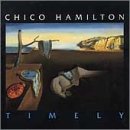Home » Jazz Articles » Album Review » Chico Hamilton: Timely
Chico Hamilton: Timely
It is not without significance that time is what Chico Hamilton is all about.
He is perhaps one of the most musical and melodic of rhythmists - ever. Hamilton is especially adept at enhancing the beauty and iconography of a brilliant soloist. That's why he's always been Lena Horne's first-choice drummer. It's not that he uses a lot of percussion. Nor does he need to. He finds music in rhythm, so there's no need to be as showy, loud or obtrusive as so many drummer-leaders do.
His technique sets him apart. Simply listen to what he can do with only one cymbal. Sometimes two. Or consider how he can suggest landscapes with provocative and sensationally quiet sweeps across his toms. Or hear what he does behind any guitarist (for years, his rhythm instrument of choice - over the more domineering piano). Jim Hall, John Pisano, Dennis Budimer, Eric Gale, Joe Beck, Cary DeNigris: all completely different sounds, yet all entirely compatible to Chico Hamilton's groove. You soon become aware Hamilton is not behind the music at all. He's very much part of it. It's his music. It's his time.
There are, then, certainly a few different ways to read the title of his newest disc, Timely, the drummer's debut on the new All Points Jazz label and his first since 1993's stunning solo disc, Dancing To A Different Drummer (although a still unreleased acid-jazz album was recorded in the interim).
Timely works the same sax/guitar/electric bass/drums format as Hamilton's 1980s group, Euphoria. But, here, the sound is not the heavy metal jazz it once was. It is a more refined approach that recalls Hamilton's Solid State, Blue Note and Mercury records from the 1960s and 1970s and finds front-liners Eric Person (reeds) and Cary DeNigris (guitar) honing their own unique voices.
The program sounds familiar and new all at once. The disc, two thirds of it by Hamilton himself, abounds in its leader's simple themes (ever present in Hamilton's repertoire since Charles Lloyd resigned as musical director). Hamilton eschews fully developed melodies in favor of establishing a hypnotic groove. He knocks out a spiky riff or a cogent theme. Then his players are provided ample solo space for commentary - though, at least here, Hamilton's latest protégé, the Jaco-fied electric bassist Paul Ramsey, gets a bit more solo space than ideas to fill it with. While Hamilton hardly ever solos, his authoritative, musical presence is never in question.
"Cheek's Groove," a Person original, opens the disc, powered by the same groove that drove Hamilton's legendary jam, "Conquistadores" (1965). Here, a retooled funk vamp shows off the fresh compatibility between the drummer, the bassist and, most especially, Person's soprano and DeNigris's guitar (whose solo here crosses Pat Martino's craftiness with Larry Coryell's early metallica). Like the song it's based on, "Cheek's Groove" is indeed the sum of its parts and a triumphant commentary on Hamilton's assemblage and musical conception.
The guitarist also figures prominently on the disc's other two highlights, the lovely "Denise" (originally from 1979's Nomads ) and the atmospheric "Malletdonia" (from the Hamilton bag of exotica that produced "El Moors" and "Manila," with Person quite appealing on flute). In both cases, DeNigris digs deep in to Gabor Szabo's gypsy bag for some startling and supremely noteworthy performances.
Elsewhere, Hamilton seems interested in dealing with the blues, which seems fine by Person, the naturally dominant voice throughout the remainder of the program. Hamilton alternates a variety of blues rhythms in "Another Shade Of The Blues" to spotlight Person's especially attractive alto-glyphics (a sort of mix of Arthur Blythe and Kenny Garrett). Hamilton also provides two takes of "These Are The Dues" (first explored on 1992's Reunion ), a bloozy swagger highlighting DeNigris in the first and a speedy Brazilian stroll centered on Person for the second. "Mother Tucker," another blues that seems to be a reconsideration of 1966's "Jim-Jeannie," provides notable, but quite different features for both DeNigris and Person.
Throughout, Hamilton is never at a loss for setting the good groove and leading the musical charge. In Person and DeNigris, especially, Hamilton has also solidified another wonderful team; incisive and swinging and in perfect accord with the drummer. It's one of the things Hamilton does best. But the music's what you'll remember: well-timed, indeed, perhaps even timeless too.
Tracks:Cheek's Groove; Another Time For The Blues; These Are The Dues, Part 1; Jeffrey Andrew Caddick; I.C.Y.; Mother Tucker; The Affair; Denise; These Are The Dues; Part 2; Malletdonia.
Players:Chico Hamilton: drums; Eric Person: alto sax, soprano sax, flute; Cary DeNigris: 6 & 12-string electric and acoustic guitars; Paul Ramsey: Fender & 5-string bass.
Personnel
Chico Hamilton
drumsAlbum information
Title: Timely | Year Released: 1999 | Record Label: All Points Jazz
< Previous
Holiday Music '99
Comments
Tags
For the Love of Jazz
 All About Jazz has been a pillar of jazz since 1995, championing it as an art form and, more importantly, supporting the musicians who create it. Our enduring commitment has made "AAJ" one of the most culturally important websites of its kind, read by hundreds of thousands of fans, musicians and industry figures every month.
All About Jazz has been a pillar of jazz since 1995, championing it as an art form and, more importantly, supporting the musicians who create it. Our enduring commitment has made "AAJ" one of the most culturally important websites of its kind, read by hundreds of thousands of fans, musicians and industry figures every month.




















